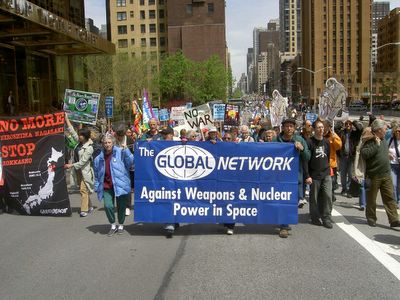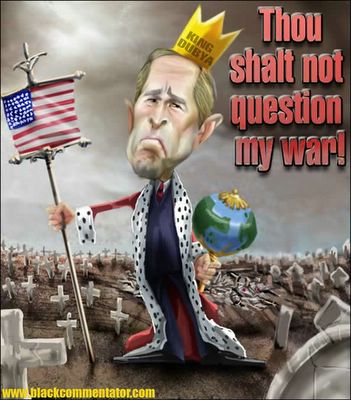
For GOP voters, the 2004 presidential election was little short of miraculous: Behind in the Electoral College even on the afternoon of the vote, the Bush-Cheney ticket staged a stunning comeback. Usually reliable exit polls turned out to be wrong by an unprecedented 5 percent in swing states. Conservatives argued, and the media agreed, that "moral values" had made the difference.
In his latest book, Fooled Again: How The Right Stole The 2004 Election, And Why They'll Steal The Next One Too (Unless We Stop Them), Mark Crispin Miller argues that it wasn't moral values which swung the election -- it was theft.
TERRENCE McNALLY: You're a professor of media studies. According to your bio, you write about "film, television, propaganda, advertising and the culture industries …" Why did you write this book?
MARK CRISPIN MILLER: Out of a sense of civic emergency. I believe that "Fooled Again" makes the case quite persuasively that there is actually no convincing evidence that Bush and Cheney won re-election.
This is a civic story of the utmost importance. It has to do with the dire need for election reform in the United States. But it's also a story about the colossal failure of the American press to do precisely the kind of job that the framers had in mind when they wrote the First Amendment. What they had in mind was that the press would function as a reliable check on executive power. It would keep the people informed about what their government was up to, and it would keep them politically engaged in national debate.
The newspapers, as limited and defective as they were in the 18th century, did perform that function, and I believe they performed that function for much of our history. We now have a corporate media system that is not answerable to the people nor concerned about the people, but [is] in the service of its pay masters. And it is far too close to the government for the health of anything like a democratic system.
One of the points of "Fooled Again" is that this is a story of tremendous importance, as far as a democracy is concerned. Yet the press has for the most part ridiculed those who have come up with very solid evidence of fraud. They've been in the business less of talking about the situation than of preventing anybody else from talking about it. And this includes some of the progressive media as well. In fact, the most hostile reviews that I've received have been in Mother Jones and Salon.
TM: I read the transcript of you on Democracy Now! with Mark Hertsgaard, a progressive journalist who has been fairly dismissive of those questioning Bush's victory. By the end he seemed to be agreeing that everything should be more fully investigated.
I would think that the 2004 election story, if tracked and broken, would be huge for whoever breaks it. Any other thoughts about why it's so ignored?
MCM: We have to understand that for some decades the press has served basically an establishmentarian function. They have the reputation, and they certainly have the self-image, of being terribly skeptical, prone to disrespectful questions, probing dark matters that authority would just as soon have them leave alone. That's a very flattering view of the press but completely undeserved. The press will not deal with any story that goes beyond a particular scandal to cast doubt on the very viability of the entire system. The press in this country will studiously ignore any story that too violently rocks the boat, whose implications are too shattering.
This is not new. Watergate was a story that the press avoided for months and months. Only the Washington Post pursued that story; everybody else made fun of it. Now we look back on Watergate with tremendous nostalgia and self-congratulation, telling ourselves the press saved the system. But since Watergate the press has preferred to deal with meaningless and trivial scandals like the Clinton scandals. They will not talk about 9/11, they will not talk about the theft of the last three elections.
TM: You also include the 2002 congressional election. That one also broke too consistently against predictions?
MCM: That's exactly right. In Colorado, in Minnesota, in Georgia, and in a couple of other states -- there was what we might call "Diebold magic" everywhere. In all these states, you had far-right-wing politicians predicted to lose by pre-election newspaper polls and by exit polls, and all of them won.
TM: Why do you believe the two successive Democratic candidates have given in so easily?
MCM: I think basically Al Gore in 2000 and John Kerry this last time are far too concerned with establishment opinion, far too worried that they'll seem to be sore losers, conspiracy theorists, etc. They have therefore refused to go public with what they actually believe. Kerry told me personally on October 28th at a fundraising party that he believes the election was probably stolen.
TM: He then disavowed that in the press, didn't he?
MCM: Exactly -- a few hours after the story broke. The Democratic Party is as much a part of the problem as the Republican Party.
TM: Are there exceptions among the ranks of mainstream politicians? I think of Barbara Boxer and John Conyers. Any others?
MCM: Tom Daschle has told me he thinks very highly of the book and has given me permission to quote him to that effect. Stephanie Tubbs Jones, Rush Holt. There are growing numbers of Democratic politicians who are willing to take the risks of facing the truth on this issue.
Let's put it less dogmatically. All right, maybe I haven't proven that the election was stolen, but I am completely confident that I've provided ample grounds for a serious investigation of what went on last year. It seems to me that any Democrat who refuses to even go for that kind of inquiry is really failing his or her constituency.
TM: -- and failing the voters. As a citizen, it bothers me that we leave it to a Gore or a Kerry, who's thinking about his future reputation or his future career, to stage the protest. I don't care about their careers. I care about my vote getting counted or discounted.
What's the statement that you're willing to make in "Fooled Again" about the 2004 election: stolen? worthy of investigation? evidence clearly shows in six states …?
MCM: The evidence in Ohio, as anyone who followed the story knows, is copious. Bush allegedly won that state by 118,000 votes. As I point out -- and this part of the book is largely based on John Conyers' report to the House Judiciary Committee -- the various stratagems, tricks and tactics used to prevent people from registering, to prevent them from voting, to throw away provisional ballots -- all these add up to a number far greater than 118,000.
TM:: That's news to me. Many people have said, yes, there were long lines, yes, there was disproportionate distribution of voting machines, yes, there was trouble with provisional ballots, yes, there was intimidation -- but the margin was 120,000. You're saying that they add up to over 120,000?
MCM: Oh easily, easily. It was in the urban parts of Ohio that most of this stuff went down. All the urban centers in Ohio were Democratic. If people want to get a strong sense of what was happening at the grassroots level coast to coast last year, go to a website called the Election Incident Reporting System, EIRS. Then type in the name of a state or a county, and you'll get a transcript of all the complaints that were lodged that day by people who called 1-866-MY-VOTE.
Now a lot of them couldn't get through because it was understaffed, but those who did get through left messages. You can find copious firsthand evidence of what the average person had to go through to try to vote against Bush. This didn't happen only in Ohio. Electronic touchscreen machines flipped Kerry votes into Bush votes in at least 11 states.
TM: You say similar practices (and occasionally worse ones) were applied in several other key states -- Florida, Oregon, Pennsylvania, New Mexico, Nevada, Arizona and even New York?
MCM: In New Mexico, for example, we're told that Bush won by some 7,000 votes. We know of over 17,000 Democratic voters who were unable to cast a vote for president because the touchscreen machines in their districts refused to record a vote for president.
These 17,000-plus New Mexicans turned out to vote in Democratic areas, and they didn't record a vote for president. Seventeen thousand is 10,000 more than 7,000. That glitch alone can account for the ostensible victory margin of Bush over Kerry in New Mexico. Greg Palast's new book will have a whole chapter on New Mexico. It's hair-raising stuff, and we haven't heard a word about it. The same kind of thing happened in Iowa, where Bush supposedly won by under 10,000 votes.
Tom Daschle was supposedly beaten in South Dakota by 4,500 votes. There was so much chicanery going on there, that it's easy to argue that John Thunes should not have won. I know Daschle believes he was robbed.
This isn't only a matter of the White House, it's also a matter of the Congress. I don't believe that this government represents the people of this country. The people of this country, however frightened some of them may be by terrorism, are essentially not theocratically inclined. They don't want a Christian republic. They were not happy with the way the government dealt with the Terry Schiavo case. Americans basically believe in the American system of government. Checks and balances, the separation of church and state.
The press kept telling us after the election that a huge outpouring of religious voters account for Bush's miraculous victory. Well that's nothing more than a talking point that the religious right itself put out after the election. There is no statistical evidence whatsoever that there was any increase in the number of religious voters.
TM: The big thing that people seized on was one particular exit poll in which people, when given a choice of a few things, said moral values was the No. 1 reason for their vote. More people answered moral values in 1996 and in 2000 than in 2004. There was actually a drop in the number of people who attributed their vote to moral values in 2004, not a rise.
Let me check a couple of things with you. I've heard that exit polls were most inaccurate -- by a big margin -- in those areas that used electronic voting machines with no paper trail. True?
MCM: That's basically true, and it was particularly noticeable in five swing states. There's a lot of stuff floating around out there in cyberspace about the exit polls. The question of the exit polls has been very badly muddied by a lot of disingenuous argument. Now a lot of people think that it's not a reliable gauge, it doesn't tell us anything. That's actually the result of propaganda obfuscation. The exit polls' sudden divergence, sudden wrongness in these five states is really a remarkable deviation from the norm.
The guy doing the best work on that particular issue is a statistician at the University of Pennsylvania named Steve Freeman, who will have a book coming out in a few months primarily about the exit poll question.
Bogus reasons for why the exit polls were so wrong include the reluctant responder argument, which holds that Bush voters were strangely reluctant to tell exit pollsters how they voted. Well, Freeman has read the raw data at precinct level and has discovered that, as a matter of fact, if anyone showed a greater reluctance to come forward and say honestly who they voted for when confronted with an exit pollster, it was actually the Democrats. There's no evidence of any numerical kind that can support the view that somehow Republicans wouldn't fess up.
TM: I would assume that the very ones being referred to as reluctant are the ones who would be proud to say they voted for God's candidate.
MCM: One of the weirdest things about this whole election business is that one of the two parties has, for over the last year and longer, been vociferously complaining about the dangers of election fraud, and that's the Republican party.
TM: Thus the ID card in Georgia, right?
MCM: Exactly. They're the ones who are always screaming about Democratic fraud, but the Republicans in this last race were really the only ones engaging in election fraud.
This has to do with the peculiarly paranoid quality of the crusading mindset. I believe this theft was to a great extent carried out thanks to a kind of crusader mentality. I've got plenty of evidence in the book that the religious right played an enormously large role in the theft of the election last year.
TM: I think first of Diebold, I think of the Ken Blackwells or the Kathryn Harrises. How does the religious right itself play a role beyond mobilizing its own troops?
MCM: That mobilization is significant when you consider that a lot of those troops have actually become embedded inside the election system.
TM: Local polling officials, that sort of thing?
MCM: One Democratic election judge tried to observe the vote count in Pima County, Arizona. A roomful of polling personnel who all belonged to the same evangelical church in the area started to call him a liberal demon, a liberal scum.
TM: When you talk about a crusader mentality, you basically mean that if you do not support my candidate you are an infidel -- and the ends justify the means?
MCM: Precisely. See, all these crimes that I attest to in the book were committed with impunity by people who regard their political adversaries as demons. And that's not an exaggeration. You know, this government is to a great extent dominated by people who have that metaphysical view of the current political situation.
It is a very serious mistake I believe to think that all of this is happening only because of the excessive greed of certain corporate powers. That greed is decisive It played an enormous role. There is no question about it. But it could not have succeeded without the vigorous grassroots assistance of a lot of people who are religious true believers. And I think that they include the likes of Tom DeLay and others.
TM: I've heard that almost all irregularities worked in Bush's favor. True?
MCM: Absolutely true. I have not yet heard of a single example of a touchscreen voting machine flipping a Bush vote into a Kerry vote. This does not mean it never happened. I'm just saying I haven't heard about it if it has.
TM: I've read that in New Hampshire, Ralph Nader's Green Party campaign paid for an actual recount. They picked the precincts they thought were suspicious, and the hand recount confirmed the actual vote totals and showed that the exit polls were, in fact, wrong. What do you say to that?
MCM: Well, the recount that they paid for found no evidence of fraud in that particular case.
TM: It confirmed the hand recount, showing that the exit polls were in fact wrong. So how does that fit your analysis of the whole scheme?
MCM: The only thing one can say about that with any scientific certainty is that the particular hand count that they carried out did not reveal any evidence of fraud. That does not mean that no fraud was committed. This is a very fine point, but when we're dealing with questions of electoral honesty and accuracy, I think we have the right to make fine points. The distinction must be made -- that particular hand count involved a sample, that sample revealed no fraud, but that does not mean that we can then sit back and say, well, OK, so the exit polls were wrong.
TM: To the question "What is the point of revisiting the last election?" you point out that there has never been a great reform that was not driven by a major scandal. Do you believe that true election reform is not going to happen until the people and the media finally wake up to this?
MCM: I think it's going to depend on the people. It's going to depend on the people simply and irresistibly insisting that the media finally deal with this subject. That's why I wrote the book.
Interviewer Terrence McNally hosts Free Forum on KPFK 90.7FM, Los Angeles (streaming at kpfk.org).
















